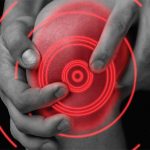“Our findings contribute additional evidence that insomnia is a significant pain-related issue. … [Knee osteoarthritis (OA) patients] with insomnia experience greater pain, depression and pain-related catastrophizing,” write Claudia M. Campbell, PhD, associate professor at Johns Hopkins University School of Medicine in Baltimore, and her colleagues.
Published in the October 2015 issue of Arthritis Care & Research, the study examines the relationship between sleep and central sensitization (e.g., hyperexcitability in nociceptive pathways known to amplify and maintain clinical pain) in patients suffering from knee OA. The researchers also measured the effects of catastrophizing, a persistent cognitive effect associated with negative pain outcome.
In the multimodal sleep study, 208 participants were separated into four groups characterized as with and without insomnia and/or knee OA. Methods of data collection included an extensive evaluation of clinical pain measures and quantitative sensory testing, as well as sleep diaries, actigraphy and polysomnography.
The Results
Of the four groups, the knee OA-insomnia (OA-I) group demonstrated the greatest degree of central sensitization compared with controls. “Knee OA-I showed strong evidence of sleep continuity disturbance measured across multiple modalities. These findings suggest various differences between knee OA patients with and without insomnia … in terms of sleep parameters, psychological factors, clinical pain and laboratory pain sensitivity,” write the authors in their discussion.
Also, individuals with low sleep efficiency and high catastrophizing scores reported increased levels of central sensitization—a result that was also associated with increased clinical pain.
“Catastrophizing significantly mediates the severity of [central sensitization] in participants,” they write. “These results provide preliminary evidence in support of a combined effect of catastrophizing and sleep, resulting in increased pain sensitivity in OA. … This is the first examination to our knowledge that demonstrates the interactive effect of catastrophizing and sleep duration on [central sensitization].”
Authors conclude their study by highlighting the importance of assessing sleep efficiency in patients suffering form long-term pain. They write, “Clinical implications of these findings suggest that treatment options for OA patients could include sleep and/or intervention for catastrophizing, both modifiable risk factors that may aid in reducing [central sensitization] and decreasing clinical pain.”
Campbell CM, Buenaver LF, Finan P, Bounds SC, Redding M, McCauley L, Robinson M, Edwards RR, Smith MT. Sleep, pain catastrophizing and central sensitization in knee osteoarthritis patients with and without insomnia. Arthritis Care Res (Hoboken). 2015 Oct;67(10):1387–1396. doi: 10.1002/acr.22609.


